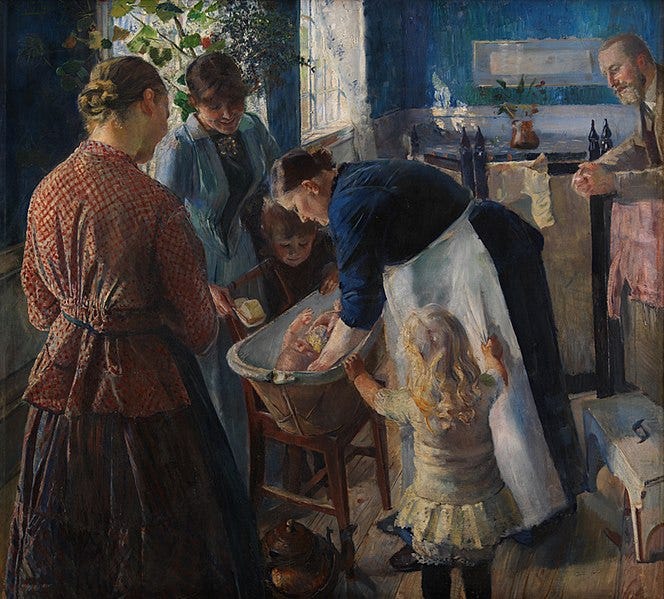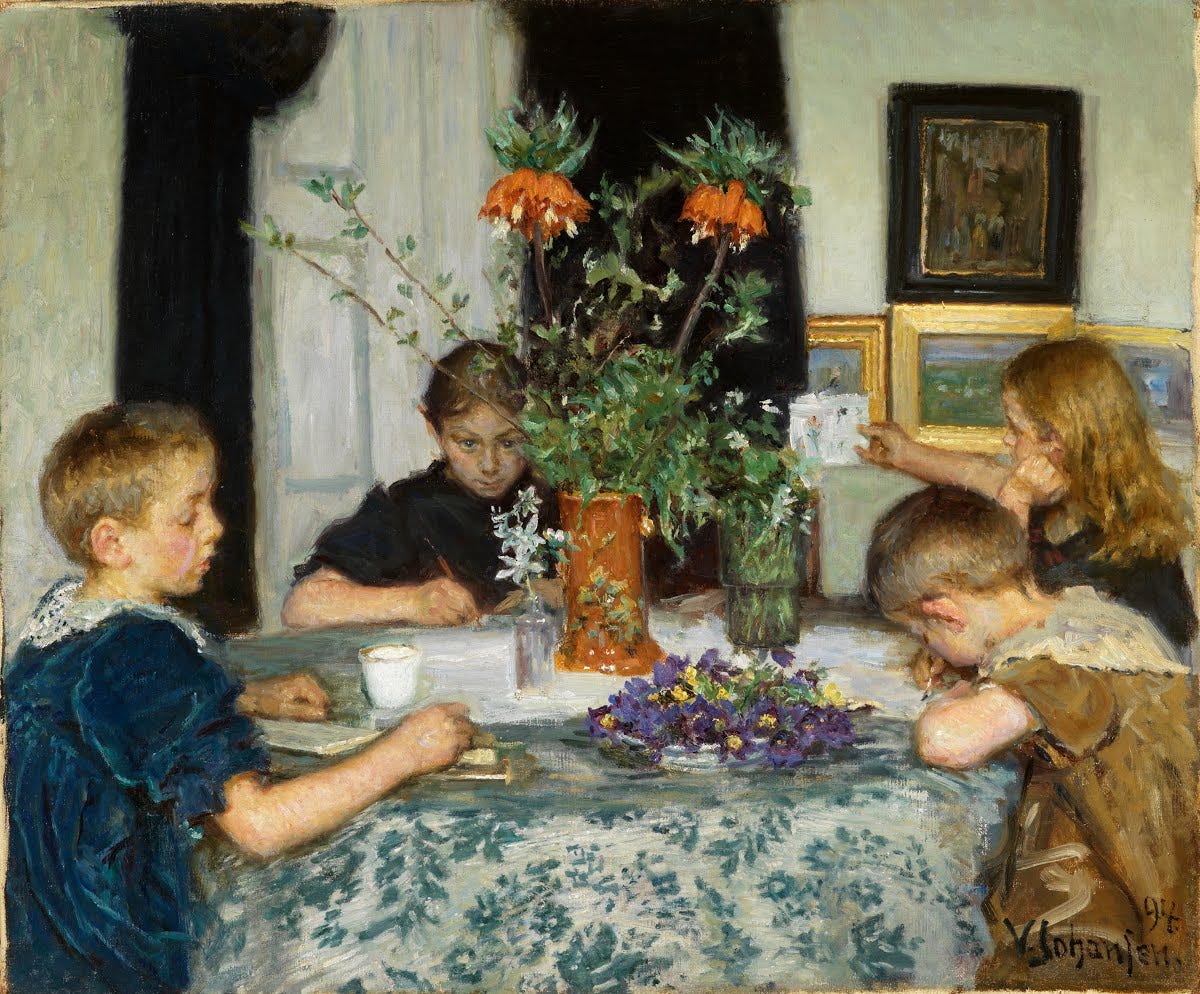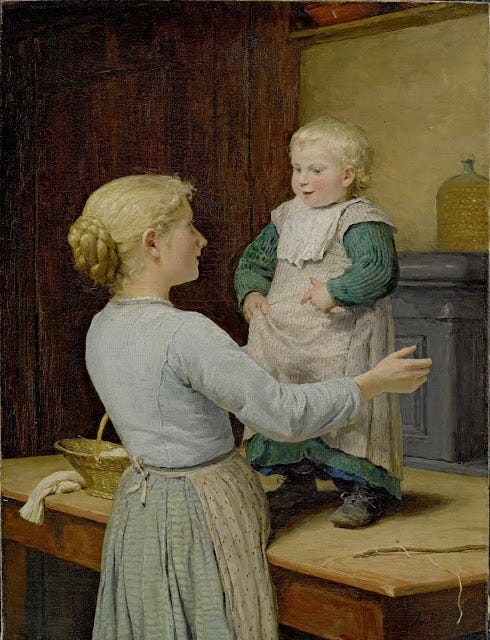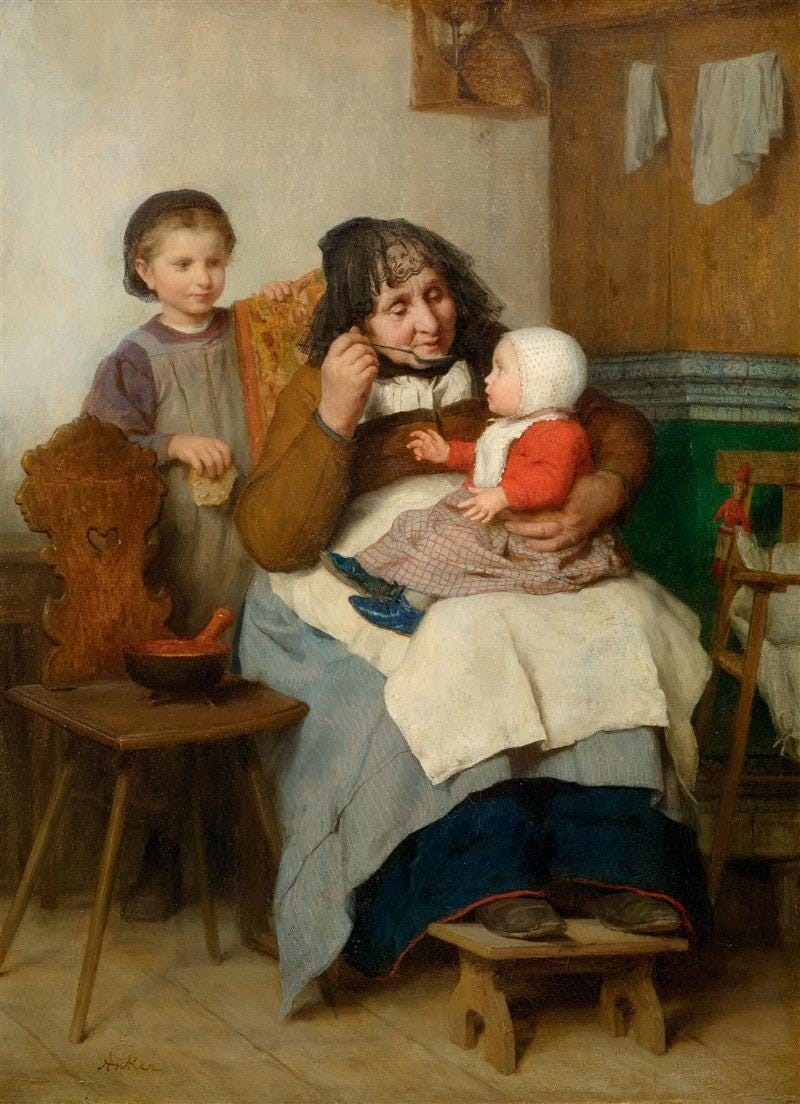Machine Antidote 101: How to Apprentice a Human
Nuclear meltdown, the chosen vs. the given, and three essentials
Note: If you prefer to read this article off screen, you can download a pdf version of it here: Machine Antidote 101: How to Apprentice a Human
“Without the hope of posterity, for our race if not for ourselves, without the assurance that we being dead yet live, all pleasures of the mind and senses sometimes seem to me no more than pathetic and crumbling defences shored up against our ruin.”
― P.D. James, The Children of Men
During Lent I (Ruth) gave up scanning news sites, and have not returned to regularly reading them since. The one instance where I do encounter headlines is during my gym visits, where a dozen screens lined side-by-side alternate between Halloween horror bake shows, music hot takes, and breaking news. A couple of weeks ago, the announcer reported soberly that the average cost of raising two children in Canada ranges from around 250,000 to over 500,000 dollars and could be much higher should the child have special needs. The accompanying image loop showed children eagerly completing worksheets and filing down school hallways, while experts discussed the various costs of daycare, housing, clothing, and other living expenses in a disinterested, factual tone. The clear (but unstated) message was: kids are expensive and you can likely not afford more than one.
It struck me that this news piece sounded like an eerie precursor to the scene in Children of Men, where the news reporter laments that the last human being to be born on earth was killed in a pub brawl. In P.D. James’s novel, the human race had mysteriously lost the ability to procreate, and the world’s population was rendered hopeless in facing a certain end. While we do not face sweeping infertility, populations are cratering in South Korea because of “anti-natal engineering”, and our excessive self-focus, and disinterest in the other, is leading us into an unprecedented future of a world without babies1.
Before you start to worry that this piece will meander down doomsday lane, let me assure you that we remain focused on hope, and directed action. There is no use to be found in painting a hopeless future, as
noted in his most recent article: “Ethics, after all, may begin in moral description, in criticism and judgment, but must offer something of a vision of how to move forward.”Nowadays, something uncomfortable tends to creep around the word “family”. The mere mention of the word with any degree of sympathy can be construed as flag waving for one political or social group, or animosity toward another. It’s a sign of our times that even the commonplace things of life are ground down to gunpowder and packed into ideological bullets.
This is not our view. We value family not for what it might or might not represent ideologically, but because we have lived it, experienced it, suffered with it, rejoiced in it, failed in it, hoped in it. The experience is in our marrow. It’s also in the historical marrow of every people in every age2—whether the nuclear families of 1955, or the tribal families of our nomadic ancestors.
In our last post we explored the 3Rs of Unmachining, the third of which was a return to embodied human relationships. Today we pick up that thread within family and its unique role in forming human beings, and how it offers us a natural antidote to the Machine.
Nuclear Meltdown
It’s been all over the internet the past few years: the nuclear family is in decline, officially over, no longer the norm, dead, a historical mistake.
Loosely defined, the nuclear family means a mother and father and a couple of kids. But all these things, whichever way we parse them up—mothers, fathers, children, marriages, households—have been statistically shrinking. In his 2020 article The Nuclear Family was a Mistake David Brooks cites the statistics:
In 1960, 72 percent of American adults were married. In 2017, nearly half of American adults were single.
Over the past two generations, people have spent less and less time in marriage—they are marrying later, if at all, and divorcing more. In 1950, 27 percent of marriages ended in divorce; today, about 45 percent do.
From 1970 to 2012, the share of households consisting of married couples with kids has been cut in half.
The general American birth rate is half of what it was in 1960.
In 1970, about 20 percent of households had five or more people3. As of 2012, only 9.6 percent did. In 2012, most American family households had no children.4 More homes today have pets than kids.
Brooks’s article is long and historically sweeping—a highly recommended read—and one of his main points is this: The nuclear family that dominated society from about 1950 to 1965 was a freakish historical moment that obscured the fragility of this kind of family.
That fragility is plain to see. If one of the two parents in a nuclear family gets sick, dies, or leaves the family, then the family system becomes far less stable, and more susceptible to stress and breakdown.
According to Brooks, one of the reasons nuclear families functioned as well as they did in the (pre-feminist) past, is because married women tended to stay at home caring for the children. An atmosphere of front porch community also prevailed in many neighborhoods, and nuclear families often informally supported each other, so that, for instance, friends felt free to discipline one another’s children. All this created a kind of “modified extended family”, which presumably offset some of the inherent frailty of the nuclear family.
But if that “freakish” moment of history is now gone, what is the risk if the nuclear family dies?
The Given and the Chosen
When we step into the family, by the act of being born, we do step into a world which is incalculable, into a world which has its own strange laws, into a world which could do without us, into a world that we have not made.
G.K. Chesterton
For those who cringe at talk of salvaging the nuclear family, or any of its constituent parts, there is hope: choice.
Some things are given to us, and some things are chosen. We don’t choose the families we were born into, or our native society and culture. These are givens. We get a certain mother and father without any say in the matter, and a certain language, a religion or no religion, traditions, habits, practices, and powerful stories about our identity—all this before we’re old enough to read and think rationally about whether we like it or not.
It seems unfair. The given puts a yoke on us, steering us at times in directions we don’t want to go, and giving rising to struggles we didn’t ask for. Why did I have to be born in this family, or in this country? Why do I have to deal with these people?
It might help to remember that struggles like this aren’t always bad. We build mental and emotional muscle mass from having to deal with the challenges in life we didn’t choose. Paradoxically, it is limits that stretch us and push us toward growth. As Ruth noted in a recent interview:
When I first anticipated motherhood I did so with the realization that there would be challenging times, but also with the delusion that I would be able to manage them swiftly and smoothly. I was thinking with the mind of an individual who had not yet learned that having children stretches one’s emotions and patience to extremes that cannot be imagined, only experienced. In her most recent piece
stated "…in no other place will I see my flaws more clearly. These souls I’ve been given to steward will encourage me to work towards wholeness; towards holiness." I think while we are single, we can be under the illusion that we are a strong and patient person. Little ones will tear that illusion down pretty quickly and start to expose the weaknesses that we need to work on.
And if, in the end, we need to make a change to be free of the struggle of our “givens”, we have a choice: We can divorce our spouses, and we can change our friends, lovers, communities, jobs, and sometimes our languages and countries and our gods. There is seemingly no end to our capacity for inventing and reinventing ourselves.
Between these two polarities—the given versus the chosen—we face a fine balance. If we turn too far from what is given to us, if we have too much choice, then we might define ourselves and the reality outside of us too heavily based on how we feel in the present moment, or on what fits with our personality. We might also become susceptible to whatever situational influences are strongest in our environment—media, entertainment, peer groups, marketing.
This can create problems. Our feelings and personality preferences can mislead our perceptions, and situational influences don’t always have our bests interests in mind. Trying too hard to invent ourselves can leave us with a self-focused or highly distorted idea of social reality. It can be disastrous for children, who are already emotionally vulnerable. Having too much freedom to invent ourselves can also lead to the constant stress of needing others to affirm us in our invention—and there’s no guarantee that others will do that.
It seems to me that those who experience the world this way simply don’t have an inward sense of being a complete person, except inasmuch as this is scaffolded from outside….A few years back I wrote a long essay in Palladium about how this reflects a worldview that rejects shared meanings as oppressive by definition, in favour of radical self-creation. But the problem with insisting that you are the sole arbiter of yourself is that self-creation means nothing until someone else agrees with the truth of whatever you’ve created.
from Denying my existence by
Still, there’s a great virtue in the freedom of the “chosen”. If we remain too attached to what is given to us, then we might never discover who we are and where we belong. We might live a life according to a preordained template that doesn’t map well onto our minds, our inclinations, our unique needs and unique perception of life. To be trapped within a traditional set of familial or social givens can be stifling, even a torment. Nobody wants to live tangled up in somebody else’s barbed wire, no matter how much others insist it’s for our own good.
Whichever way we lean, whether toward the given, or the chosen, or some combination of these, the problem of learning to be human never leaves us. We still need an apprenticeship where we learn essential social skills, cultivate long-term stability and commitment in our relationships5, and witness and practice self-sacrifice.









